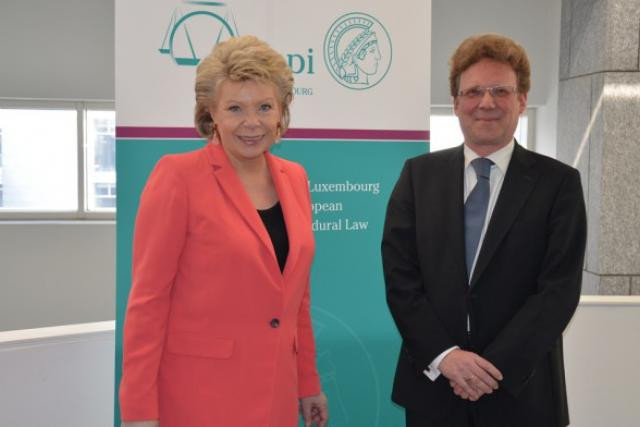Viviane Reding, Vice-President of the European Commission and Commissioner for Justice, Fundamental Rights and Citizenship, visited the Max Planck Institute Luxembourg for International, European and Regulatory Procedural Law on 25 March 2014. Professor Dr. Burkhard Hess, Executive Director of the Max Planck Institute Luxembourg, welcomed Mrs Reding and with her around one hundred guests to the lecture taking place at noon. He stressed in his introductory remarks that mutual trust in judicial matters required a high degree of knowledge of European legal systems and thus a "European academia" was necessary which the Max Planck Institute would from part of. In the presence of the President of the General Court of the European Union, Marc Jaeger, German Ambassador Christine Gläser and several members of the Court of Justice of the European Union, Vice-President Reding gave her lecture on the topic of “Exequatur and mutual trust in the EU civil justice area – recent achievements and future perspectives”. In her speech, Mrs Reding emphasized that on the way to a true European area of civil justice mutual trust between EU Member States and their different justice systems was indispensable. Such trust was not made by decree but needed time to grow and attention to keep it strong. It was the prerequisite for the mutual recognition of foreign judgments as the cornerstone of judicial co-operation within the European Union. Proceedings in family matters, for example, were complex, lengthy, costly and could even lead to contradictory results in different Member States. By judicial co-operation and the abolishment of exequatur, all barriers in the EU internal market should be removed and the incompatibilities and complexities of the different legal systems should be overcome in the interest of the citizen. Using a comparison with a bridge, the Vice-President clarified that not harmonization of the different laws of the Member States was key in the European justice area but the building of bridges from one national legal system to the other. The upcoming challenge was to ensure that the bridges between the different legal systems which were already built by the existing instruments of co-operation in civil matters were structurally sound and provided with proper safeguards.
Vice-President Reding welcomed the foundation of the Max Planck Institute Luxembourg as an institution which helped build such mutual trust by improving the knowledge on procedural law thus furhtering mutual trust in that field.
After the lecture, a lively discussion between Vice-President Reding and the audience developed during which, among others, human rights protection and the rule of law in the EU were addressed. The event concluded with a reception which gave Mrs. Reding and the guests an opportunity to meet and continue the dialogue Informally.
